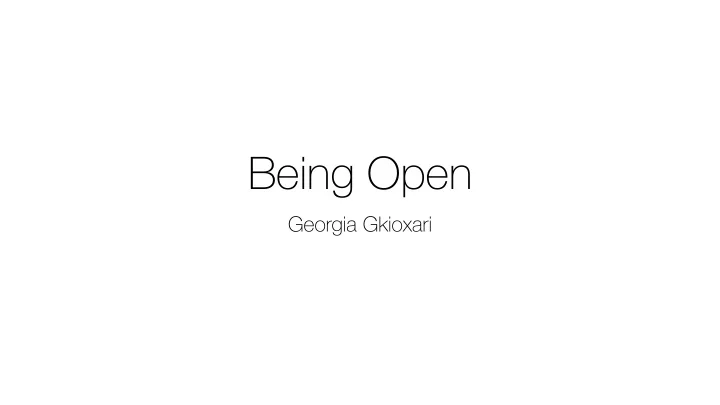

Being Open Georgia Gkioxari
Background
Background GREECE
Background GREECE UC Berkeley
Background • 2010: Greece UC Berkeley • 2016: PhD with Jitendra Malik • 2016-2018: PostDoc at FAIR • Now: Research Scientist at FAIR
Background • I have written non deep learning papers • I have had my papers rejected • Many of my research ideas did not work • I have collaborated with more than 20 people (UC Berkeley, FAIR, Google, INRIA, Georgia Tech, CMU, …) • I have served on many program committees • I have served as an area chair for CVPR 2018 • I try not to think about research one day a week • I value a healthy work/life balance
Principles of Research Quality Your work reflects yourself and subsequently your community
Principles of Research Quality Honesty • We operate on the assumption that everybody is honest • Utopian society • It is our responsibility to preserve this
Principles of Research Quality Honesty Openness • We share papers, code, models, dataset • We collaborate
Principles of Research Quality Honesty Openness • We share papers, code, models, datasets (open-sourcing) • We collaborate (collaborations)
Part A: Open-Sourcing
Examples of Open Source Projects Datasets PASCAL VOC, ImageNet, MS COCO, … Libraries VLfeat, Caffe(2), (Py)Torch, Tensorflow, … Models DPM, AlexNet, R-CNN, ResNe(X)t, Mask R-CNN, …
Open-sourcing A scientific community without open-sourcing: • Every group has to collect their own dataset (~1 year to collect/annotate/curate ImageNet) • Every group has to (re)implement and (re)train their own models (~ 1 year to implement Caffe from scratch) + (~ ½ year to implement and test ResNe(X)t) = 2 ½ years to implement a baseline (almost half a PhD career)
Open-sourcing Is this progress ? • Benchmarking & comparisons become impossible • Baseline implementations become noisy/inaccurate • Not all groups have the resources to do this chaos
Incentives for Open-sourcing Short term • CVPR publications should be accompanied by code & models • Community awards for Best Open-Source Projects • Citation/star counts for open source projects • Professors, group leads, companies should reward open-sourcing Long term • Career evaluations (i.e. tenure, promotions) should be based on open source projects
Part B: The merits of collaborating
Collaborations Collaborations for researchers are the equivalent of travelling
Collaborations Collaborations for researchers are the equivalent of travelling
Collaborations Collaborations for researchers are the equivalent of travelling • You open your research horizon • You get to experience different work styles • You learn to listen, argue and adjust • You learn to work with different personalities • You usually get exposed to different set of problems growth
Collaborations Collaborations are bidirectional Junior Senior Researchers Researchers
The merits of Collaborating For Junior Researchers • They learn to work in a different environment • They experience different work styles than their PhD advisor • It’s a chance to work in different topics • They mature For Senior Researchers • They get to train the next generation of scientists
Incentives for Collaborations • Explicitly reward collaborations during career evaluations • Reward collaborative projects outside ones comfort zone (high-risk projects) • Cross-university or university-industry student co-advising
Conclusions A good citizen of CVPR is the one that pushes the field forward • High quality research work • Bringing researchers closer together • Sharing with the community If you are a junior scientist, be open to collaborations with peers If you are a senior scientist, mentor juniors
Recommend
More recommend